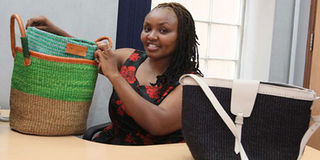Plastic bags ban gave me a business breakthrough

Wanjiku Njenga. She runs a kiondo business that she hopes will create more job opportunities. PHOTO | COURTESY
What you need to know:
- When Kenya banned the use of plastic carrier bags in 2017, a business opportunity landed on her laps.
- Wanjiku still has challenges getting clients to see the value of her work, to see why a kiondo would cost thousands of shillings.
When most people see a handmade kiondo, they think of an old woman with sisal and knitting wool whiling away time.
When she sees a kiondo, 33-year-old Wanjiku Njenga sees a luxury fashion accessory. Through her business Shkwela Kiondo, Wanjiku manufacturers and spruces up kiondos for a living.
“In the last two years, Skwela has grown from just a kiondo business to home décor, where we revamp homes with our baskets and wall baskets from all over Africa,” she offers.
On a regular day at work, you might find Wanjiku either touching base with her team of fundis on the production process, interacting with customers both on and offline, or sourcing for materials that include leather and fabric, or on site with her team for wall basket installations.
How many types of kiondo are there? “Many. We have `the stylish kiondo bags which are fashion accessories, wall baskets like the Tonga baskets from Zambia and Zimbabwe, Rwandese peace baskets, storage baskets from Lodwar, and planter kiondos - perfect for covering pots,” she says.
Her products range from between Sh1,500 and Sh5,000.
GLOWING CAREER
Wanjiku’s journey to entrepreneurship begins with a love story. Her love story with hand crafts.
Growing up in Isiolo, her father owned a curio shop, so little Wanjiku spent a lot of time experimenting with beads.
Wanting to create and beautify came naturally to her. She was eight years old when she made her first necklace and 20 when her first client bought a necklace she had made off her neck.
“I was great with my hands but I never thought of it as a career.”
She loved to create and beautify but the environment she grew up in pushed her in a different direction.
“I grew up in a marginalised community in Isiolo. I saw women get abused, girls go through female genital mutilation, and adults just not aware of their rights. The need to empower communities and change lives motivated me to go to law school,” she recalls.
She went on to have a seven-year long career in the NGO world where she rose ranks from volunteer to project manager.
She was in charge of various projects ranging from water and sanitation to child protection and children’s rights.
ADDING CREATIVITY
For a while there, she felt fulfilled. Then in 2017, Kenya banned the use of plastic carrier bags and a business opportunity landed on her laps.
“This was the perfect chance to be part of the change. To be part of a cleaner Kenya. So I started buying and selling kiondo shopping bags online.
To my surprise, I sold my first batch fast, an indication that Kenyans had quickly embraced the change that was the plastic ban and that they actually loved using Kiondos, which for a while had been sidelined. That gave me morale to buy and sell more,” she says.
Business was good, but with time she felt the need to give her clients more. Her creative side was itching.
To make the kiondos more appealing, she began creating new designs and colour combinations.
To achieve this, she formed women groups in Mwingi, Machakos Kwale, Lamu and finally, Iringa in Tanzania, providing them with the materials and paying them on completion.
“This way, I can still pursue my passion while still empowering communities just like I had dreamed.”
CAPITAL CHALLENGE
Whilst the Kenyan market has warmed up to the kiondo, Wanjiku still has challenges getting clients to see the value of her work, to see why a kiondo would cost thousands of shillings.
“Business capital is also a big challenge for young businesses. I remember sitting on my plan because I couldn’t execute it until my husband gave me the starting capital.
Financial institutions have little or no faith in startups such that when the micro or small enterprises require loans for growth and expansion, they can’t access them,” she says.
Her dream for her business is to have her very own well-equipped workshop, create more job opportunities, expand my export market, produce more eco-friendly luxury kiondo bags and keep being part of a cleaner environment.
“Having a business is like having a child, you never really switch off. Still, I look for time to take at least one leisure trip a month.”
Over time, she has also learnt to schedule everything including phone time so that she can be a more present wife and mother to her five-year-old daughter.
“She just started losing her teeth and won’t stop asking questions about anything and everything,” she shares on motherhood.





